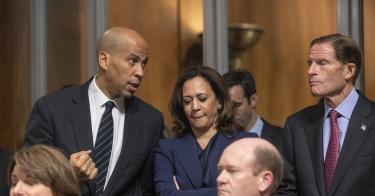When it comes to confirming President Trump’s judicial nominees, left-wing groups say “Jump” and Senate Democrats ask “How high?” The groups have told Democrats to slow down the judicial-confirmation process and they are doing what they are told.
The slow slog to confirmation begins as soon as a nomination makes it out of the Judiciary Committee. Democrats have found several ways to make the confirmation process more cumbersome and time-consuming than ever.
First, Democrats have forced the Senate to take a separate vote to invoke cloture, or end debate, on 48 judicial nominees. That’s nearly ten times more than during the first two years of the previous nine newly elected presidents combined.
Second, Democrats have forced the Senate to take a formal roll-call vote to confirm a higher percentage of judicial nominees from Trump than from any new president in history. What difference does it make? Rather than confirm nominees by a voice vote that takes about 30 seconds and does not require the presence of senators, the Senate must use a roll-call vote that takes about 35 minutes and requires that all senators show up.
Third, Democrats have opposed Trump’s judicial nominees far more than any president in history. In fact, 46 Trump nominees received negative confirmation votes, compared to 45 nominees during the first two years of the previous 23 newly elected presidents combined. That’s going back to before Abraham Lincoln.
Or look at this wave of opposition in a different way. Trump’s 85 judges received more total negative votes for confirmation than all 2,653 judges confirmed during the entire 20th century combined.
Which brings us to the latest category of unprecedented obstruction. Senate Rule 31 requires that nominations that are neither confirmed nor rejected during the two-year Congress in which they are made expire and must be returned to the president. Traditionally, the minority party agrees to confirm at least some of these pending nominations in the final days before adjournment. Today, however, the groups have told Democrats to oppose any such confirmation package and, of course, Democrats have complied.
Let’s compare 2014, the last mid-term election year, when the partisan roles were reversed. Democrats controlled the White House and Senate, Republicans were in the minority. By the last two weeks of the 113th Congress, the Senate had confirmed 115 of President Obama’s judicial nominees, and judicial vacancies were down to about 65. Yet in those last two weeks, the Senate found time to confirm 17 more judges — 15 of them without a roll call vote.
Today, in the closing days of the 115th Congress, the Senate has confirmed 85 Trump nominees, and vacancies top 130. Yet, as one news report put it, Democrats will not agree to “a customary year-end package of judicial nominees” because of “pressure from left wing groups.” How noble.
This is what a fit of partisan spite looks like. Even though confirmations are down and vacancies are up, Democrats would rather keep the judiciary understaffed and overworked than cooperate with Republicans.
This piece originally appeared in National Review



